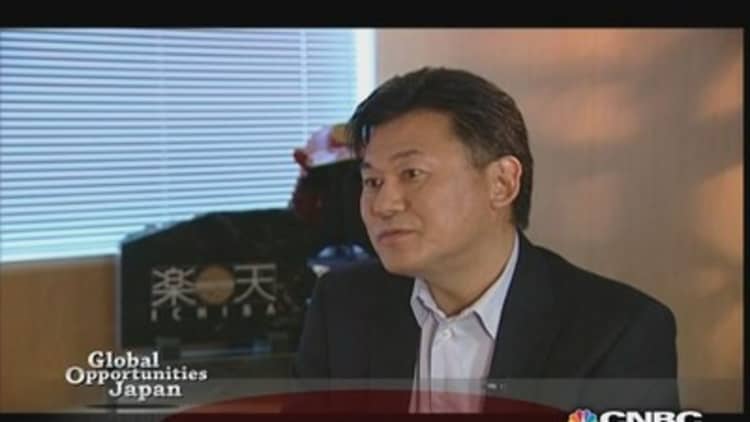
A looming consumption tax hike has dented sentiment over Japan's economy, but the bite on consumers may prove a boon for online retailers, the CEO of Japanese ecommerce titan Rakuten said.
"People will become more price sensitive and online has a price advantage," Hiroshi Mikitani, chairman and CEO of Rakuten, told CNBC.
"The percentage of the online shopping will grow and accordingly, I'm hoping that it will increase our absolute transaction volume," Mikitani said. "This may be a turning point for online shopping industry in Japan."
(Read more: Japan's sales tax hike: What you need to know)
Online shopping hasn't captured as much of the market in Japan as in other developed countries. Japan's online sales were around 3.9 percent of the country's total retail sales in 2012, dwarfed by around 9.7 percent in the U.K. and 6.53 percent in the U.S., according to data from a Cushman & Wakefield report.
Mikitani expects the tax hike will have a less negative impact on online shopping compared with physical retail as even if online prices rise, they will likely remain lower than in bricks-and-mortar stores.
Japan is bracing for its first sales tax hike since 1997, with the rate set to rise to 8 percent from 5 percent on April 1 and many consumers likely front-loaded spending ahead of the increase.
The decision to raise the sales tax, given the go ahead by Prime Minister Shinzo Abe last October, has proved controversial. Critics argue the move will derail Japan's economic recovery, with consumers possibly forced to cut back spending as hoped-for wage increases have yet to materialize. Those in favor of the hike say it is essential for bringing down a massive debt burden.
(Read more: Rakuten chief attacks Shinzo Abe over reform U-turn)
The tax hike is part of the prime minister's plan, dubbed Abenomics, to kick-start Japan's moribund economy out of its decades-long struggle against the pressures of deflation through a series of monetary easing measures and structural reforms.
But some skepticism has emerged over whether Abenomics' promised reforms will ever be implemented.
(Read more: Why you should be patient with Abenomics)
Indeed, Mikitani had threatened to quit the Industrial Competitiveness Council, which advises the prime minister, after the failure of efforts to liberalize rules to allow internet sales of over-the-counter medication, a measure opposed by bricks-and-mortar retailers.
The actual issue was "trivial," Mikitani said, but added, "It was very, very symbolic for the entire deregulation."
He views deregulation as key to maintaining Japan's competitiveness as more free trade zones spring up globally.
"The more protective you become of domestic industries, the less competitive most likely you're going to be," he said. "If you keep doing this, you will be segregated from the rest of the world."
(Read more: Does Sony's revamp signal a sea change for Japan Inc?)
How to face global competition is particularly important to Rakuten as it works to extend into more markets, in part through creating online-shopping access via instant-messaging service Viber, which it acquired in February for $900 million.
One of the challenges the company has faced is changing its "official" language to English from Japanese, a project which began three years ago, Mikitani said.
(Read more: Japan's Rakuten says to buy Viber Media for $900 million)
"Of course, there are still some people who are struggling," he said, although he's seen a great deal of improvement.
"This has been a social experiment (in) …changing the people, (and) not necessarily firing domestic and hiring international," he said.
"My vision is to open their eyes to look at their entire world and communication in a global standardized language," he added. "This is the only way a service company can become truly global."
—By CNBC.Com's Leslie Shaffer; Follow her on Twitter @LeslieShaffer1


